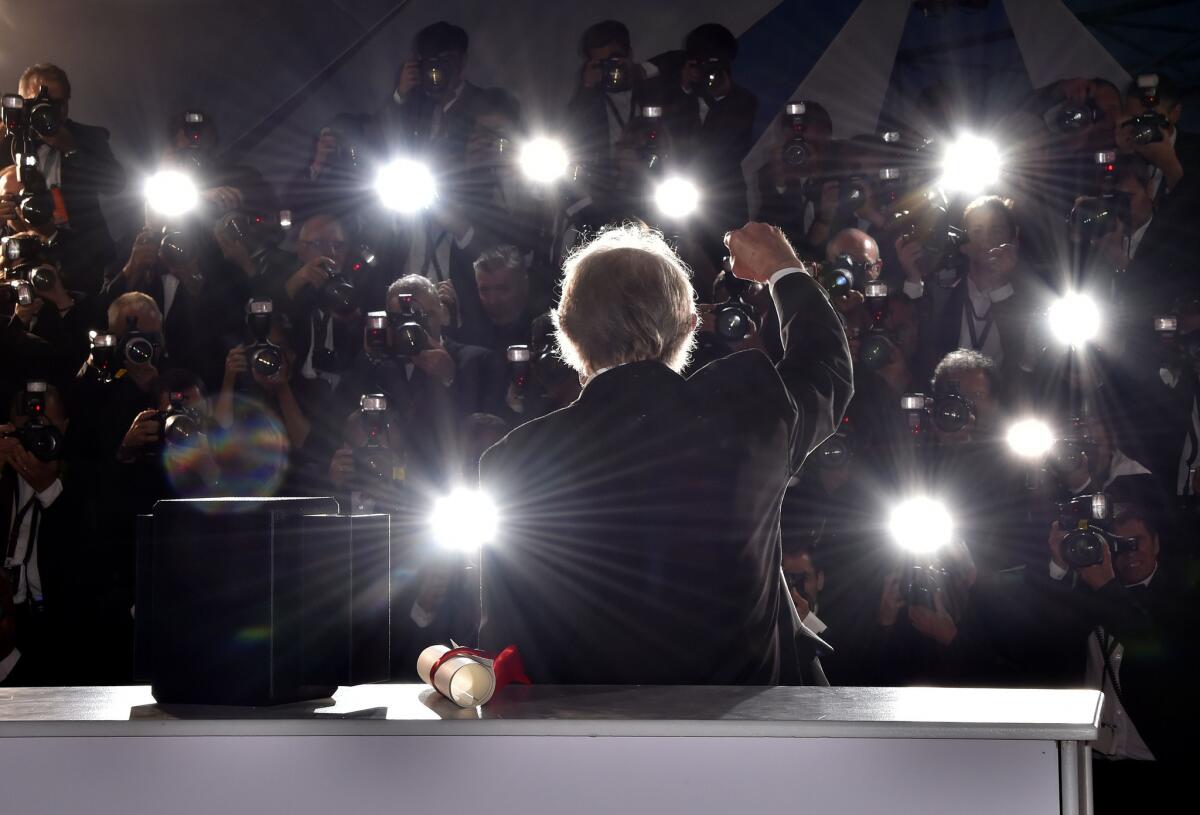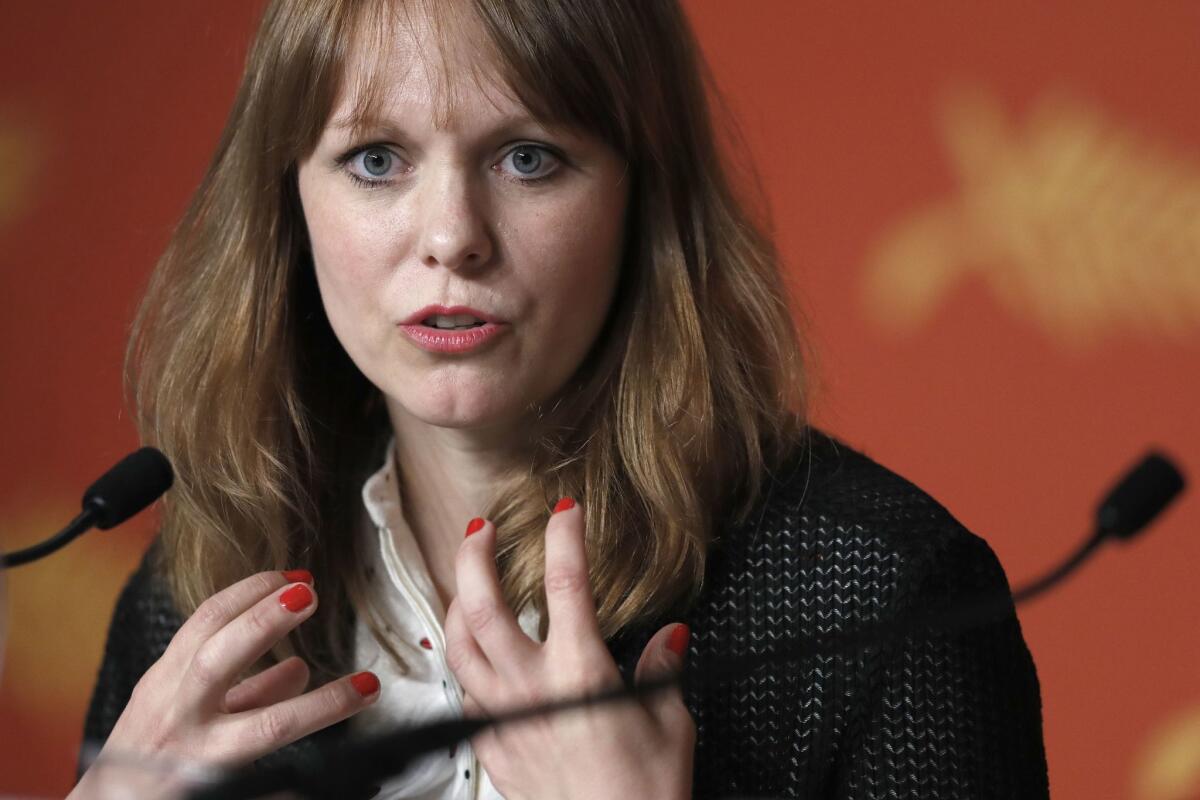‘I, Daniel Blake’ wins Cannes’ Palme d’Or as a jury goes its own way

British director Ken Loach with his trophy after winning the Palme d’Or at the Cannes Film Festival.
- Share via
Reporting From Cannes, France — It’s not always noted, but there are two Cannes film festivals, one composed of critics, journalists and industry professionals, and the other inhabited by the sequestered jury. Sometimes these two Cannes speak with one voice, but in this 69th festival, they definitely did not.
The German film “Toni Erdmann,” directed by Maren Ade, one of the few women in the competition, was easily the non-jury favorite among the 21 films eligible for prizes.
Both wildly raucous and movingly humane, it chronicles the evolving relationship between a prankster father and his high-powered careerist daughter. Far from winning a top prize, however, “Toni Erdmann” was totally shut out by the jury chaired by “Mad Max” director George Miller.
Instead, the Palme d’Or went to 79-year-old British filmmaker Ken Loach for “I, Daniel Blake,” the on-the-nose narrative of working-class folks getting the run around from an unfeeling government welfare bureaucracy.
Loach, who first won the Palme a decade ago for “The Wind That Shakes the Barley,” did give an impassioned acceptance speech, championing “a cinema of dissent against those who are powerful and mighty. We must show that another world is possible and necessary.”
Aside from “I, Daniel Blake,” the big winner Sunday night was Iranian director Asghar Farhadi’s solid but unremarkable “The Salesman,” which took two awards.
A drama about revenge and its discontents, “The Salesman” took home both the best screenplay prize for Farhadi and the best actor prize for his star Shahab Hosseini, who plays a high school teacher-actor starring in a Tehran production of “Death of a Salesman.”
Splitting the best director prize were France’s Olivier Assayas for his unclassifiable, Kristen Stewart-starring “Personal Shopper,” and Romanian auteur Cristian Mungiu for “Graduation,” a gripping story of a loving father facing a moral dilemma in a corrupt society.
The other awards, each baffling in its own way, included the Grand Prix to Canada’s Xavier Dolan for his “It’s Only the End of the World,” the Jury Prize to Britain’s Andrea Arnold for “American Honey,” and the best actress award to Jaclyn Jose, the star of Phillipine director Brillante Mendoza’s “Ma’ Rosa.”
Especially glaring in the face of all this was the neglect of “Loving,” arguably the most satisfying of the English-language films in the competition.
Centering on “Loving v. Virginia,” the landmark 1967 Supreme Court case that struck down state laws banning interracial marriage, the film focuses not on courtroom drama but on the people involved. Beautifully acted by Joel Edgerton and Ruth Negga (”Jimi: All Is by My Side”) and directed with powerful but understated emotion by Jeff Nichols, “Loving” has the look of an Oscar-season contender.
One of the characteristics of this year’s Cannes is that many of its finest films were unaccountably left out of the main competition.

The best of these might have been “Neruda,” directed by Chile’s Pablo Larrain (“No”), which played in the Directors’ Fortnight event. Thoughtful and provocative, it deals with the cat-and-mouse game between a poet with a sense of history and a detective with a sense of despair (Gael García Bernal) who is trying to arrest the poet for his communist political beliefs.
Playing in the Un Certain Regard section was the lovely “After the Storm,” the drama of a feckless man trying to salvage relationships with both his family of origin and his young son, all done with the always impressive delicacy of Japan’s Hirokazu Kore-Eda (“Like Father, Like Son.”)
Several films from Israel also made a strong impression as they dealt with the way the personal becomes political and the political personal in that crisis-ridden part of the world.
Maha Haj’s debut feature, “Personal Affairs,” a low-key but pointed film that is simultaneously droll and sad, explores the lives of an extended family of Palestinian Israelis. And “Beyond the Mountains and Hills,” the latest by “The Band’s Visit’s” Eran Kolirin, is an increasingly despairing film about a society that has lost is bearings.
The festival’s Cannes Classics section, featuring restorations and films on film history, always offers unexpected experiences like 1945’s “Momotaro, Sacred Sailors,” Japan’s first animated feature, a kid-friendly film that is also a startling piece of wartime military propaganda.
The most involving films on film history included “Women Who Run Hollywood,” the not-always-told story of the power women had in the movie business’ early days, and “The Cinema Travellers,” which follows exhibitors who show films in fairground tents in the remotest parts of India.
In a class by itself was “A Journey Through French Cinema,” director-historian Bertrand Tavernier’s personal, three-hour-plus history of decades of his country’s cinema, a trip back in time that is both celebratory and smartly analytical.
As the choices above indicate, every visitor to Cannes constructs his or her own festival out of what interests them and what they can manage to see. A personal treat for me, for instance, was a fine documentary discovered in the Marche, or film market, “Robert Doisneau: Through the Lens,” a warm look at the great French photographer directed by his granddaughter Clémentine Deroudille.
Because being at Cannes is nothing if not frustrating, I leave it not satisfied, not only by the jury’s choices but also by the films I heard were wonderful that I couldn’t fit into my schedule.
These include the French, animated “My Life as a Courgette,” Finland’s “The Happiest Day in the Life of Olli Maki,” and Pietro Germi’s classic 1966 “Signori & Signore” (“The Birds, the Bees and the Italians”), long unavailable in the U.S. Cinema is a large universe, and Cannes at its best allows you to touch many of its bases.
More to Read
Only good movies
Get the Indie Focus newsletter, Mark Olsen's weekly guide to the world of cinema.
You may occasionally receive promotional content from the Los Angeles Times.











